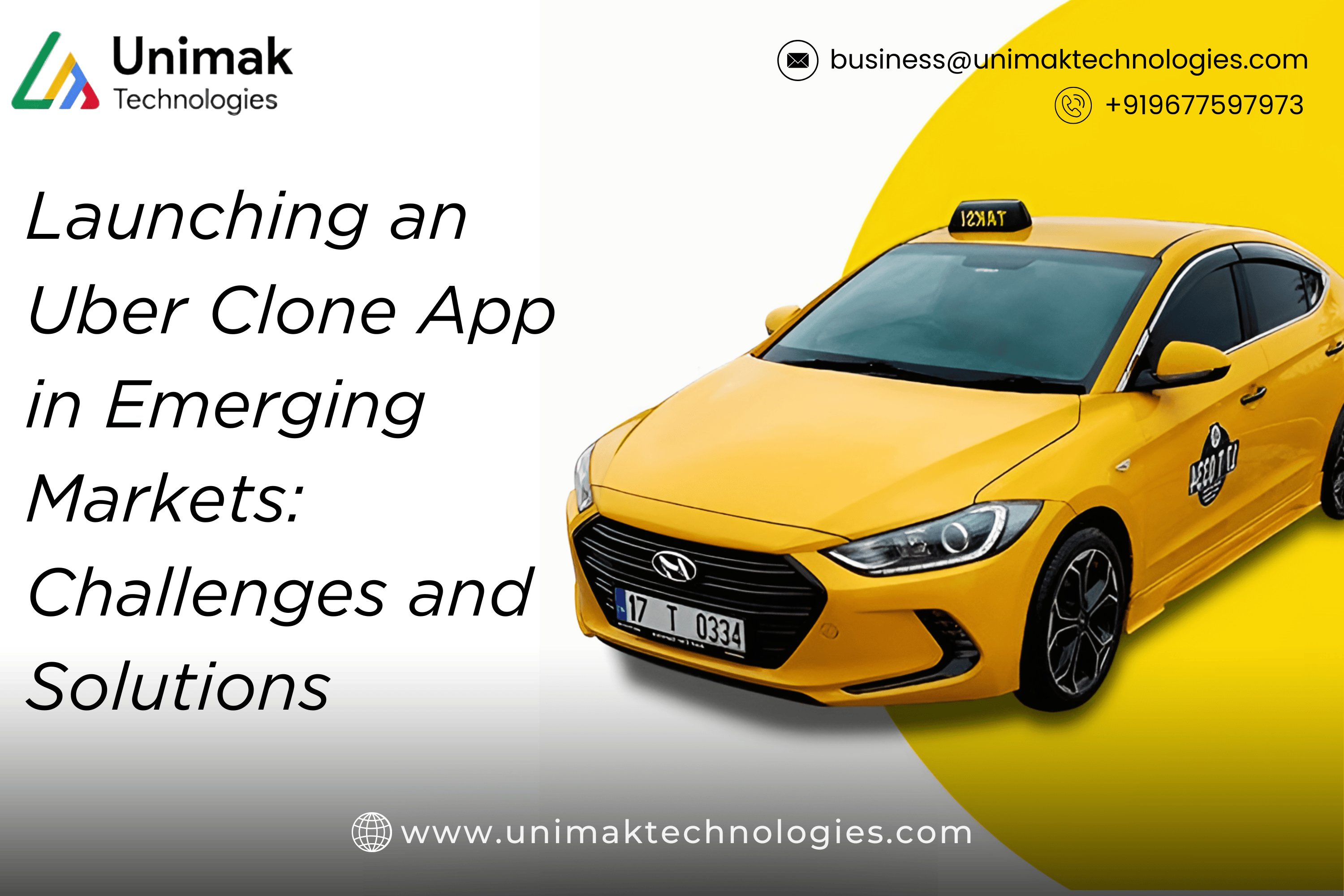 Unimak Technologies
Unimak Technologies
 27 June 2025
27 June 2025
 Uber Clone App
Uber Clone App
Launching an Uber Clone App in Emerging Markets - Challenges and Solutions
Thinking of starting a taxi service in a rapidly growing city? Ever wondered how apps like Uber or Grab made it big in places where things are a bit different? How do you get people to use your app when cash is king, or internet isn't always stable? This is for anyone curious about building a successful Uber Clone App business in vibrant, evolving economies!" The global phenomenon of ride-hailing has transformed urban mobility, offering unparalleled convenience. While established in many Western nations, the real frontier for growth lies in emerging markets. These regions, characterized by booming populations, rapid urbanization, and a growing middle class, present a fertile ground for new transportation solutions. However, success here isn't just about replicating a model; it's about deeply understanding and adapting to unique local dynamics.
In this blog, we explore how to launch an uber clone app, the real challenges faced in emerging economies, and the practical solutions that can help you build a successful ride-hailing business.
Why Uber Clone Apps Are Gaining Popularity in Emerging Markets
What they’re really asking is: how do I tap into this billion-dollar industry without reinventing the wheel?
An Uber clone app allows you to:
Launch quickly with ready-made software
Customize it for your region and audience
Save development time and cost
Compete with existing ride-hailing apps using local strengths
Key Challenges in Launching an Uber Clone App in Developing Regions
Let’s face it; building an app is just one part of the journey. When targeting countries in Africa, Southeast Asia, or South America, you need to be aware of specific local hurdles.
Poor Internet Connectivity
Challenge: Low-bandwidth or inconsistent internet in rural or semi-urban areas.
Solution: Optimize the app for low data usage. Include offline mode for drivers and lightweight user interfaces that work well even on older devices.
Limited Access to Digital Payments
Challenge: Many users still prefer cash over digital wallets or credit cards.
Solution: Add multi-payment options:
Cash payments
Mobile money integrations (like M-Pesa)
Local e-wallets
This creates trust and ease for first-time app users.
Lack of Driver Onboarding and Training
Challenge: Drivers may be unfamiliar with the technology.
Solution: Provide onboarding sessions, multilingual support in the app, and a simple dashboard with easy-to-understand earnings breakdowns.
High Competition from Local Startups
Challenge: Many local apps already know the ground reality better.
Solution: Don’t just copy Uber. Add value by:
Offering lower commission rates for drivers
Targeting niche areas like women-only rides or rural areas
Adding features like SOS buttons, vehicle tracking, and live support
Must-Have Features in Your Uber Clone App
When users search for “Best Uber clone features” or “Must-have taxi app features”, they’re looking for reliability and convenience.
Include:
Real-time GPS tracking
Fare estimation
Driver ratings and reviews
Trip history
Driver earnings dashboard
Promo codes and referral programs
Localizing the App: The Secret Sauce
Emerging markets are incredibly diverse. Language, customs, and user behavior vary widely.
Translate the app into regional languages
Partner with local drivers or taxi unions
Use cultural familiarity in your branding and marketing
Tech Stack & Development Tips
Choosing the right development approach can make or break your success.
Go for scalable tech like Node.js, Flutter, or React Native
Choose a white-label solution that allows quick customization
Make sure your admin dashboard is powerful and easy to manage
Final Thoughts: Think Local, Launch Global
Launching an Uber clone in emerging markets is about more than just technology; it's about understanding people. The key lies not in simply replicating a global model, but in understanding, adapting, and innovating to meet the unique needs and realities of each local market. By focusing on localization, building trust, and embracing flexible solutions, you can truly revolutionize transportation and empower communities in emerging economies.
